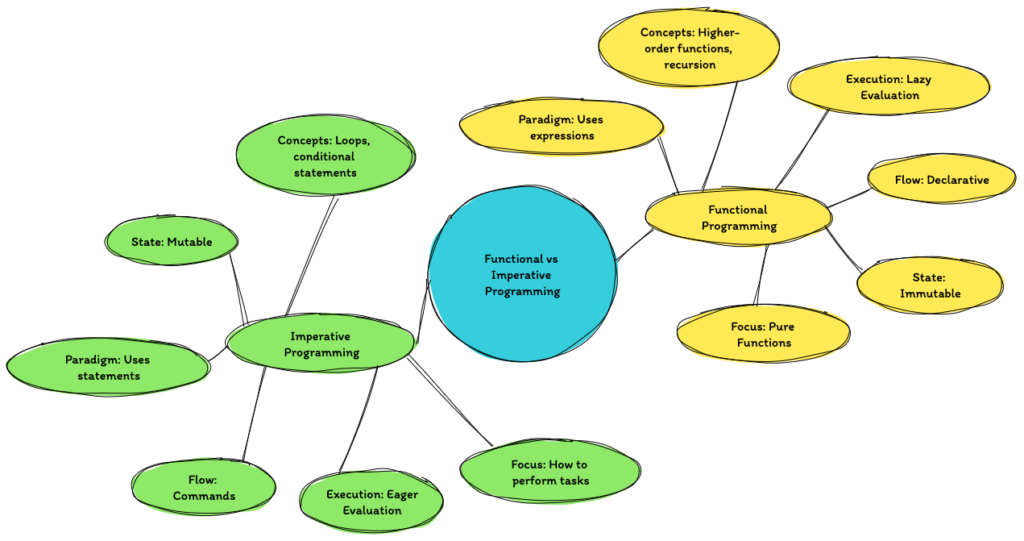Functional programming is a paradigm that treats computation as the evaluation of mathematical functions and avoids changing state and mutable data. In functional programming, functions are first-class citizens, meaning they can be passed as arguments to other functions, returned as values from other functions, and assigned to variables. This approach allows for a more declarative style of programming, where the focus is on what should be computed rather than how it should be computed.
Learning functional programming can provide numerous benefits for developers. It encourages writing code that is concise, modular, and easier to reason about. Functional programming also promotes immutability and encourages the use of pure functions, which can lead to more predictable and maintainable code. By understanding functional programming concepts, developers can improve their problem-solving skills and become more versatile in their approach to software development
Benefits Of Functional Programming
One of the key benefits of learning functional programming is its emphasis on immutability, which can lead to more predictable and reliable code. By avoiding side effects and mutable state, functional programming helps reduce bugs and makes code easier to reason about. Additionally, functional programming encourages the use of higher-order functions, allowing for more concise and expressive code that is easier to maintain.

Another benefit of functional programming is its focus on declarative rather than imperative programming. This means that instead of telling the computer exactly how to perform a task step by step, you simply describe what you want to achieve. This can lead to more readable code that is easier to understand and debug.
Overall, learning functional programming can help you become a better programmer by improving your problem-solving skills, making your code more robust and maintainable, and opening up new possibilities for tackling complex problems in a more elegant way.
How Functional Programming Differs From Imperative Programming
One major difference is the approach to state and mutability. In imperative programming, variables are mutable and can be changed at any point in the program, leading to potential side effects and making it harder to reason about the code. In contrast, functional programming emphasizes immutability, meaning that once a value is assigned to a variable, it cannot be changed. This reduces the risk of unexpected behavior and makes programs easier to understand and debug.
Another key difference is the use of functions as first-class citizens in functional programming. Functions are treated like any other data type, allowing them to be passed around as arguments or returned from other functions. This higher-order function capability enables powerful abstractions and allows for more concise and expressive code.
By learning functional programming, you can gain a deeper understanding of these concepts and improve your problem-solving skills in software development.
Key Concepts In Functional Programming
Functional programming is a paradigm that focuses on treating computation as the evaluation of mathematical functions. Key concepts in functional programming include immutability, which means that once a value is assigned, it cannot be changed; higher-order functions, which allow functions to take other functions as arguments or return them as results; and recursion, where functions can call themselves to solve problems in a recursive manner.
Additionally, functional programming emphasizes the use of pure functions, which produce the same output for a given input without causing side effects. This leads to code that is easier to reason about and test. Learning functional programming can help developers write more concise and maintainable code by encouraging them to break down problems into smaller, reusable components and avoid mutable state.
By understanding these key concepts, developers can leverage the power of functional programming to write more efficient and robust software.
Examples Of Functional Programming Languages
Functional programming languages are designed to facilitate functional programming, which is a style of programming that treats computation as the evaluation of mathematical functions and avoids changing state and mutable data. Some examples of functional programming languages include Haskell, which is a purely functional language that enforces immutability and lazy evaluation. Another example is Clojure, a dialect of Lisp that runs on the Java Virtual Machine and emphasizes simplicity, immutability, and concurrency.
Erlang is another functional language that focuses on fault tolerance and distributed computing, making it popular for building scalable systems. Functional languages like Scala combine object-oriented and functional programming paradigms to provide a powerful tool for building complex applications. These languages offer unique features such as higher-order functions, pattern matching, type inference, and strong static typing that can help developers write more concise, maintainable, and reliable code.
Learning these languages can expand your programming skills and open up new opportunities in software development.
Advantages Of Learning Functional Programming
One of the key advantages of learning functional programming is its emphasis on immutability and pure functions. By using immutable data structures and avoiding side effects, functional programming promotes code that is easier to reason about and less prone to bugs. This can lead to more reliable and maintainable software in the long run.
Additionally, functional programming encourages a more declarative style of programming, where the focus is on describing what should be done rather than how it should be done. This can lead to code that is more concise and easier to understand, making it easier for developers to collaborate on projects and for new developers to onboard.
Furthermore, learning functional programming can expand your problem-solving skills by introducing you to new ways of thinking about computation and data manipulation. By incorporating functional programming concepts into your skill set, you can become a more versatile and well-rounded developer.
Functional programming is a programming paradigm that emphasizes the use of pure functions and immutable data. It focuses on creating programs by composing functions, which makes code more modular, easier to understand, and less prone to errors. Here are some examples of how functional programming is used in software development:
- 1. Map, Filter, and Reduce: Functional programming languages provide built-in functions like map, filter, and reduce, which allow developers to manipulate collections of data easily. These functions enable developers to apply transformations, filter data based on certain conditions, and aggregate values.
- 2. Pure Functions: In functional programming, pure functions are used extensively. These functions do not have any side effects and always produce the same output for the same input. Pure functions are easier to test, reason about, and parallelize, making code more reliable and scalable.
- 3. Immutability: Functional programming promotes the use of immutable data structures. Instead of modifying existing data, functional programmers create new data structures with desired changes. This approach eliminates many common bugs caused by mutable state and makes code more predictable.
- 4. Higher-Order Functions: Functional programming languages support higher-order functions, which are functions that can take other functions as arguments or return functions as results. Higher-order functions enable developers to write reusable and composable code.
- 5. Recursion: Recursion is a fundamental concept in functional programming. Instead of using loops, functional programmers often use recursion to solve problems. Recursive functions call themselves with smaller inputs until a base case is reached.
- 6. Lazy Evaluation: Functional programming languages often use lazy evaluation, where expressions are not evaluated until their results are actually needed. This can improve performance by avoiding unnecessary computations.
Functional programming is gaining popularity in software development due to its many benefits. By using pure functions, immutability, higher-order functions, recursion, and lazy evaluation, developers can write more reliable, scalable, and maintainable code. Incorporating functional programming principles into your development process can lead to more robust and efficient software solutions.

